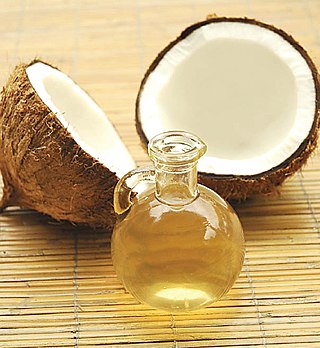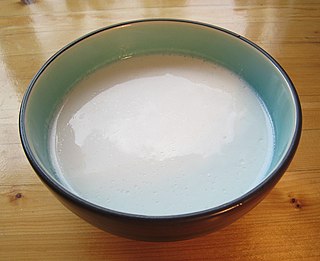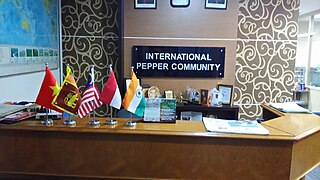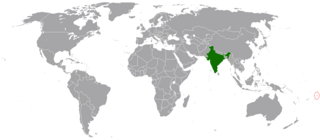
The International Maritime Organization is a specialised agency of the United Nations responsible for regulating maritime transport. The IMO was established following agreement at a UN conference held in Geneva in 1948 and the IMO came into existence ten years later, meeting for the first time on 17 March 1958. Headquartered in London, United Kingdom, the IMO, in 2024, has 176 Member States and three Associate Members.

The coconut tree is a member of the palm tree family (Arecaceae) and the only living species of the genus Cocos. The term "coconut" can refer to the whole coconut palm, the seed, or the fruit, which botanically is a drupe, not a nut. They are ubiquitous in coastal tropical regions and are a cultural icon of the tropics.

The Association of Southeast Asian Nations, commonly as ASEAN, is a political and economic union of 10 states in Southeast Asia. Together, its member states represent a population of over 600 million over a land area of 4.5 million km2 (1.7 million sq mi). The bloc generated a purchasing power parity (PPP) gross domestic product (GDP) of around US$10.2 trillion in 2022, constituting approximately 6.5% of global GDP (PPP). ASEAN member states include some of the fastest growing economies in the world.

Asia-Pacific Economic Cooperation is an inter-governmental forum for 21 member economies in the Pacific Rim that promotes free trade throughout the Asia-Pacific region. Following the success of ASEAN's series of post-ministerial conferences launched in the mid-1980s, APEC started in 1989, in response to the growing interdependence of Asia-Pacific economies and the advent of regional trade blocs in other parts of the world; it aimed to establish new markets for agricultural products and raw materials beyond Europe. Headquartered in Singapore, APEC is recognized as one of the highest-level multilateral blocs and oldest forums in the Asia-Pacific region, and exerts significant global influence.

Coconut oil is an edible oil derived from the kernels, meat, and milk of the coconut palm fruit. Coconut oil is a white solid fat below around 25 °C (77 °F), and a clear thin liquid oil in warmer climates. Unrefined varieties have a distinct coconut aroma. Coconut oil is used as a food oil, and in industrial applications for cosmetics and detergent production. The oil is rich in medium-chain fatty acids.

The Treaty of San Francisco, also called the Treaty of Peace with Japan, re-established peaceful relations between Japan and the Allied Powers on behalf of the United Nations by ending the legal state of war and providing for redress for hostile actions up to and including World War II. It was signed by 49 nations on 8 September 1951, in San Francisco, California, at the War Memorial Opera House. Italy and China were not invited, the latter due to disagreements on whether the Republic of China or the People's Republic of China represented the Chinese people. Korea was also not invited due to a similar disagreement on whether South Korea or North Korea represented the Korean people.

The Colombo Plan is a regional intergovernmental organization that began operations on 1 July 1951. The organization was conceived at an international conference, The Commonwealth Conference on Foreign Affairs held in Colombo, Ceylon in January 1950, and was attended by the finance ministers of Australia, the United Kingdom, Canada, Ceylon, Pakistan and New Zealand, and the prime ministers of Ceylon and India. Membership has expanded significantly over the years to the current 28 governments.

Coconut milk is an opaque, milky-white liquid extracted from the grated pulp of mature coconuts. The opacity and rich taste of coconut milk are due to its high oil content, most of which is saturated fat. Coconut milk is a traditional food ingredient used in Southeast Asia, Oceania, South Asia, and East Africa. It is also used for cooking in the Caribbean, tropical Latin America, and West Africa, where coconuts were introduced during the colonial era.

Maritime Southeast Asia comprises the countries of Brunei, Indonesia, Malaysia, the Philippines, Singapore, and East Timor.

The United Nations Economic and Social Commission for Asia and the Pacific (ESCAP) is one of the five regional commissions under the jurisdiction of the United Nations Economic and Social Council. It was established in order to increase economic activity in Asia and the Far East, as well as to foster economic relations between the region and other areas of the world.

The Asia/Pacific Group on Money Laundering (APG) is a FATF style regional inter-governmental (international) body, the members of which are committed to effectively implementing the international standards against money laundering, the combating the financing of terrorism (CFT) and financing the proliferation of weapons of mass destruction. APG was founded in 1997 in Bangkok, Thailand, and currently consists of 42 member jurisdictions in the Asia-Pacific region and a number of observer jurisdictions and international/regional observer organisations.
Asia Pacific League of Associations for Rheumatology (APLAR) is a federation of organisations of rheumatology. It was established in Sydney in 1963 and the first congress was held in 1968 in Mumbai at the Taj Mahal Palace Hotel.

Coconut production contributes to the national economy of Thailand. According to figures published in December 2009 by the Food and Agriculture Organization (FAO) of the United Nations, it is the world's sixth largest producer of coconuts, producing 1,721,640 tonnes in 2009. In 2012 it was reported that Thailand had 216,000 hectares of coconut palm plantations and produced 845 million whole coconuts.

The International Pepper Community (IPC) is an intergovernmental organisation of pepper or peppercorn producing countries. Established in 1972, its headquarters are in Jakarta, Indonesia.

The Regional Comprehensive Economic Partnership is a free trade agreement among the Asia-Pacific countries of Australia, Brunei, Cambodia, China, Indonesia, Japan, South Korea, Laos, Malaysia, Myanmar, New Zealand, the Philippines, Singapore, Thailand, and Vietnam. The 15 member countries account for about 30% of the world's population and 30% of global GDP, making it the largest trade bloc in history. Signed in November 2020, RCEP is the first free trade agreement among the largest economies in Asia, including China, Indonesia, Japan, and South Korea.

Dr. Pannadasa Gardiye Punchihewa, C.C.S is a Sri Lankan author and an international civil servant.

India–Samoa relations are the international relations that exist between India and Samoa. The High Commission of India in Wellington, New Zealand, is concurrently accredited to Samoa. Samoa maintains an Honorary Consul in New Delhi.
World Coconut Day is an international day established by the Asian and Pacific Coconut Community (APCC), which is an intergovernmental organisation of coconut producing countries to recognize the importance of coconut. World Coconut Day has been observed on September 2 each year since 2009. It is celebrated by the farmers of coconut producing countries like India, Malaysia, Indonesia, the Philippines, Thailand, Kenya and Vietnam and the stakeholders in the coconut growing business. Varies activities related to promotion of coconut consumption and events to create awareness on the benefits of consuming coconuts are organized on the day.
 Fiji
Fiji  India* (1969)
India* (1969) Indonesia* (1969)
Indonesia* (1969) Jamaica* (2011, associate member)
Jamaica* (2011, associate member) Kenya (associate member)
Kenya (associate member) Kiribati* (2004)
Kiribati* (2004) Malaysia* (1972)
Malaysia* (1972) Marshall Islands* (2004)
Marshall Islands* (2004) Federated States of Micronesia* (2004)
Federated States of Micronesia* (2004) Papua New Guinea* (1976)
Papua New Guinea* (1976) Philippines* (1969)
Philippines* (1969) Samoa* (1972)
Samoa* (1972) Solomon Islands
Solomon Islands  Sri Lanka* (1969)
Sri Lanka* (1969) Thailand (1972)
Thailand (1972) Tonga
Tonga  Vanuatu
Vanuatu  Vietnam* (2004)
Vietnam* (2004)















